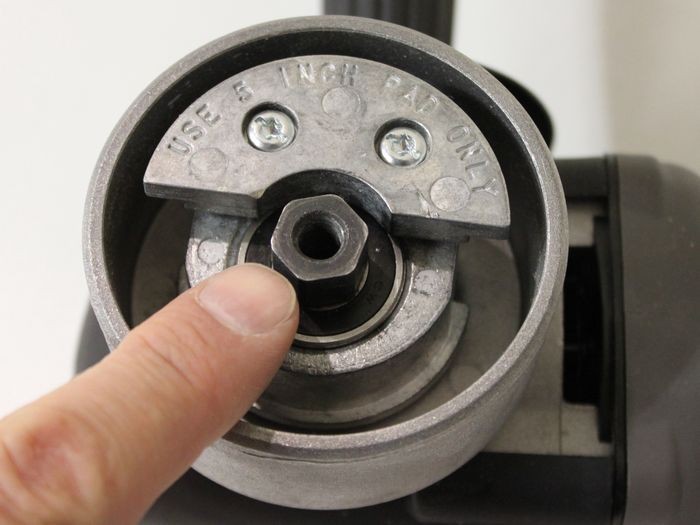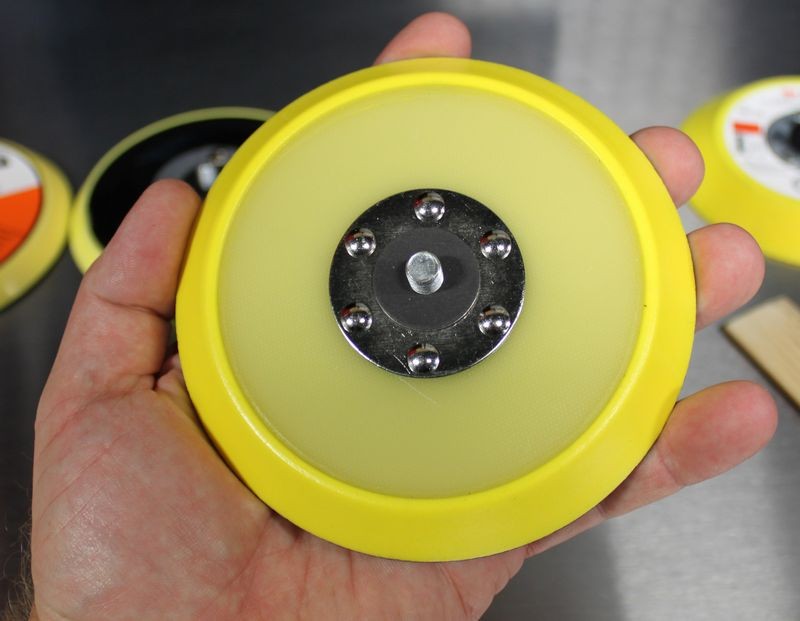Mike Phillips
Active member
- Dec 5, 2022
- 51,004
- 7
Dang...
I took pictures of the compression washer last week for an article and can't find them...
However, this topic came up last week and all I need to do is do an Advanced Search using these terms...
compression washer
and budda-bing, budda-boom...
From this thread,
Newbie that's not so new
Page 2 and post #15
Yes. Treat the compression washer like gold. Don't lose it.
Keep the little rubber nut to lock it into place when not using that backing plate. It's probably more likely you'll own more backing plates into the future than less likely.
(The proof is you're a member of this forum. Just sayin...)
I have scads of backing plates in drawer in the studio and it's nice reaching for a backing plate and having the spacer washer intact with the backing plate.
So don't lose the rubber nut and don't lose the compression washer as it performs multiple functions.
Crushable Interface
The compression washer provides a crushable or malleable interface between two pieces of metal that are going to see a lot of pressure from being tightened together with a wrench and my guess is a lot of punishment from the operator. I punish all my tools... so it's not a reach to think others are going to punish their's too. Add to the above mix, the violent oscillating action of the tool on the highest speed setting and add to that t-i-m-e...
By time, I mean putting your polisher to work buffing out a car section-by-section, panel-after-panel. As Pros know and anyone that wants to get the job in a decent amount of time, when you start buffing out a car you have to keep the tool running and buffing on paint. There's no breaks. That's time of endured punishment.
Point being is you want and need the crushable interface between two pieces of metal on an electric tool capable of running at high OPMs.
Spacer
They also act as an actual spacer between the arbor or stud seat where there are the raised heads of a type of rivet or brad that anchors the arbor base to the the backing plate and the threaded portion of the Free Rotating Spindle Bearing Assembly.
Free Rotating Spindle Bearing Assembly

From the below thread,
5 Inch Backing Plates for DA Polishers - Pictures and Links
Here you can see a compression washer seated at the base or seat of the 5/16" arbor or stud where it's attached into the backing plate surrounded by the raised heads of the rivets or attachment anchors.

So yeah... keep track of both the compression washer and the rubber nut.
Actually it's a great question.
:xyxthumbs:
I took pictures of the compression washer last week for an article and can't find them...
However, this topic came up last week and all I need to do is do an Advanced Search using these terms...
compression washer
and budda-bing, budda-boom...
From this thread,
Newbie that's not so new
Page 2 and post #15
I just have a quick.question, when I got the backing plate there was a plastic cap covering the screw and a plastic washer on it too.
Am I supposed to.keep the washer on there?
Yes. Treat the compression washer like gold. Don't lose it.
Keep the little rubber nut to lock it into place when not using that backing plate. It's probably more likely you'll own more backing plates into the future than less likely.
(The proof is you're a member of this forum. Just sayin...)
I have scads of backing plates in drawer in the studio and it's nice reaching for a backing plate and having the spacer washer intact with the backing plate.
So don't lose the rubber nut and don't lose the compression washer as it performs multiple functions.
Crushable Interface
The compression washer provides a crushable or malleable interface between two pieces of metal that are going to see a lot of pressure from being tightened together with a wrench and my guess is a lot of punishment from the operator. I punish all my tools... so it's not a reach to think others are going to punish their's too. Add to the above mix, the violent oscillating action of the tool on the highest speed setting and add to that t-i-m-e...
By time, I mean putting your polisher to work buffing out a car section-by-section, panel-after-panel. As Pros know and anyone that wants to get the job in a decent amount of time, when you start buffing out a car you have to keep the tool running and buffing on paint. There's no breaks. That's time of endured punishment.
Point being is you want and need the crushable interface between two pieces of metal on an electric tool capable of running at high OPMs.
Spacer
They also act as an actual spacer between the arbor or stud seat where there are the raised heads of a type of rivet or brad that anchors the arbor base to the the backing plate and the threaded portion of the Free Rotating Spindle Bearing Assembly.
Free Rotating Spindle Bearing Assembly

From the below thread,
5 Inch Backing Plates for DA Polishers - Pictures and Links
Here you can see a compression washer seated at the base or seat of the 5/16" arbor or stud where it's attached into the backing plate surrounded by the raised heads of the rivets or attachment anchors.

So yeah... keep track of both the compression washer and the rubber nut.
Stupid question I know, but I don't want to screw something up.
Actually it's a great question.
:xyxthumbs: